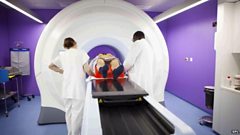Main content

Why does anti-matter, matter?
Adam Walton finds out about anti-matter - the opposite of regular matter.
Last on
Sun 31 Jan 2016
06:31
Βι¶ΉΤΌΕΔ Radio Wales
Clip
-
![]()
A matter for Antimatter
Duration: 02:42
Antimatter
Adam Walton finds out about antimatter, the "mirror image" of regular matter. Scientists from Swansea University, together with an international team at CERN have recently taken further steps towards understanding why the universe is almost entirely devoid of antimatter.
When matter and antimatter meet, they are annihilated and produce an intense burst of energy.Calculations about the start of the universe, with the big bang, tell us that there should be equal amounts of matter and antimatter, but all we see today is matter. So where is all the antimatter? It's one of the great unsolved questions in physics.
New research just published in Nature, by a team from Swansea, plus the international ALPHA collaboration of scientists based at CERN, has managed to measure a new limit on the charge of the anti-hydrogen atom, and take us closer to discovering any tiny differences between matter and antimatter, which could explain the asymmetry.
We also hear about how antimatter is used in hospitals, as part of a PET scanner (Postiron Emission Tomography) which uses positrons - the antimatter equivalent of electrons, to produce detailed images of inside the body, and is an important tool in diagnosing cancer.
When matter and antimatter meet, they are annihilated and produce an intense burst of energy.Calculations about the start of the universe, with the big bang, tell us that there should be equal amounts of matter and antimatter, but all we see today is matter. So where is all the antimatter? It's one of the great unsolved questions in physics.
New research just published in Nature, by a team from Swansea, plus the international ALPHA collaboration of scientists based at CERN, has managed to measure a new limit on the charge of the anti-hydrogen atom, and take us closer to discovering any tiny differences between matter and antimatter, which could explain the asymmetry.
We also hear about how antimatter is used in hospitals, as part of a PET scanner (Postiron Emission Tomography) which uses positrons - the antimatter equivalent of electrons, to produce detailed images of inside the body, and is an important tool in diagnosing cancer.
Broadcasts
- Tue 26 Jan 2016 18:30Βι¶ΉΤΌΕΔ Radio Wales
- Sun 31 Jan 2016 06:31Βι¶ΉΤΌΕΔ Radio Wales


